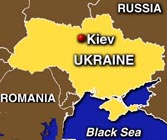Yushchenko calls for a defence of Ukraine's currency
 Kiev- President Viktor Yushchenko on Wednesday called for a tougher defence of the Ukrainian currency the hryvna, as the national bank conceded it could not prop it up at previous levels in the face of mounting bad economic news.
Kiev- President Viktor Yushchenko on Wednesday called for a tougher defence of the Ukrainian currency the hryvna, as the national bank conceded it could not prop it up at previous levels in the face of mounting bad economic news.
Yushchenko, during a meeting with foreign reporters, said Ukraine needed a strong currency to deal with short-term foreign debt of some 28 billion dollars, expected rising bills for imported Russian oil and gas, and falling tax revenues due to a stalled economy.
"A stable hryvna and its stable exchange rate, is an indivisible part of the responsibility of government," Yushchenko said.
"There is no economy that can service its external debt, if its currency's exchange rate is unstable," he added, in the Ukrainian leader's first public hint Kiev might default on some or all of its foreign debt, as a result of the world financial crisis and a domestic cash flow crunch.
Ukraine's currency and financial reputation until recently was relatively solid, with the hryvna stable relative to the dollar for much of the last decade, and Kiev's last foreign debt renegotiation taking place in faraway 2000.
But management at the National Bank of Ukraine (NBU), the semi- independent agency responsible for Ukrainian monetary policy, only hours after Yushchenko's remarks announced the bank would intervene in the exchange market at lower rates it had previously had deemed "unacceptable," as the hryvna's value continued its downward spiral.
The NBU would sell foreign currencies on the domestic inter-bank exchange market at 5.25 hyrvnas to the US dollar, NBU officials told the Interfax news agency.
The new exchange rate came one day after the NBU intervened in markets in an attempt to hold the hryvna at its target 5 hryvnas to 1 dollar rate on Tuesday, a move rejected by traders settling on a 5.5 to 1 rate or even higher.
NBU management last month said the 5-to-1 rate was the "natural" exchange rate between the two currencies, but in the last month has spent some 2.7 billion dollars of reserves in a so far failed effort to defend the Ukrainian currency.
Hryvna holders have been deserting Ukrainian money in droves since mid-September, when Ukraine's metals and chemical industries stalled on falling demand in international commodity markets. Some mills in Ukraine's once-booming steel sector have cut production by 40 per cent, Korrespondent magazine reported.
Ukraine's government over the summer, despite warnings by domestic manufacturers the policy made Ukrainian exports too expensive, supported an even stronger hryvna, in an attempt to improve the country's balance of payments.
But bad economic news and falling trust in the Ukrainian currency has reduced the value of the hyrvna some 20 per cent relative to other currencies since June.
Yushchenko called the increasingly weak position of the Ukrainian currency "deeply worrying", pointing out that bonds floated by the Ukrainian government on foreign markets now needing servicing, combined with a likely recession of Ukrainian industry, already was forcing his government to seek outside financing.
Ukraine was placing "great hope" on a multi-billion dollar assistance package possibly to be provided by the International Monetary Fund (IMF}, he said.
Ukrainian economic observers have echoed the view, saying that without the vote of confidence of an IMF cash infusion, Ukraine's once vigorous economy could implode.
Ukraine's government estimates the country's total external debt at 100 billion dollars, with some 38 per cent of the debt held by domestic banks, and 15 per cent by the government. Foreign currency reserves stand at 37 billion dollars but are falling fast.
The NBU over October spent 7 per cent of its foreign currency reserves, primarily servicing foreign market bonds but also in a defence of the hryvna, and providing emergency financing to cash- strapped banks.
Ukraine's government has struggled to control widening damage to its economy from the world financial crisis, in no small part because of political infighting and a standoff between the former Soviet republic's legislative and executive branches.
Yushchenko earlier this month dissolved parliament and announced early elections, but then called a temporary session for the legislature to pass emergency laws to deal with the financial crisis.
Sessions held this week have gone nowhere, with MPs making speeches accusing their opponents of being responsible for the country's financial difficulties, but no legislation being passed. (dpa)